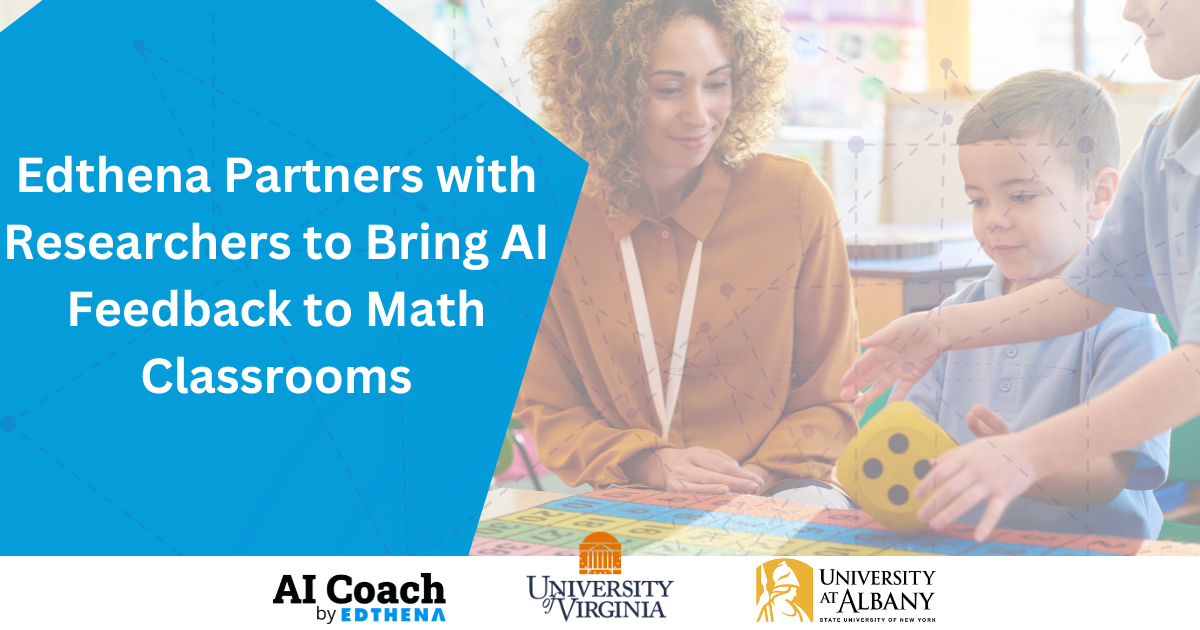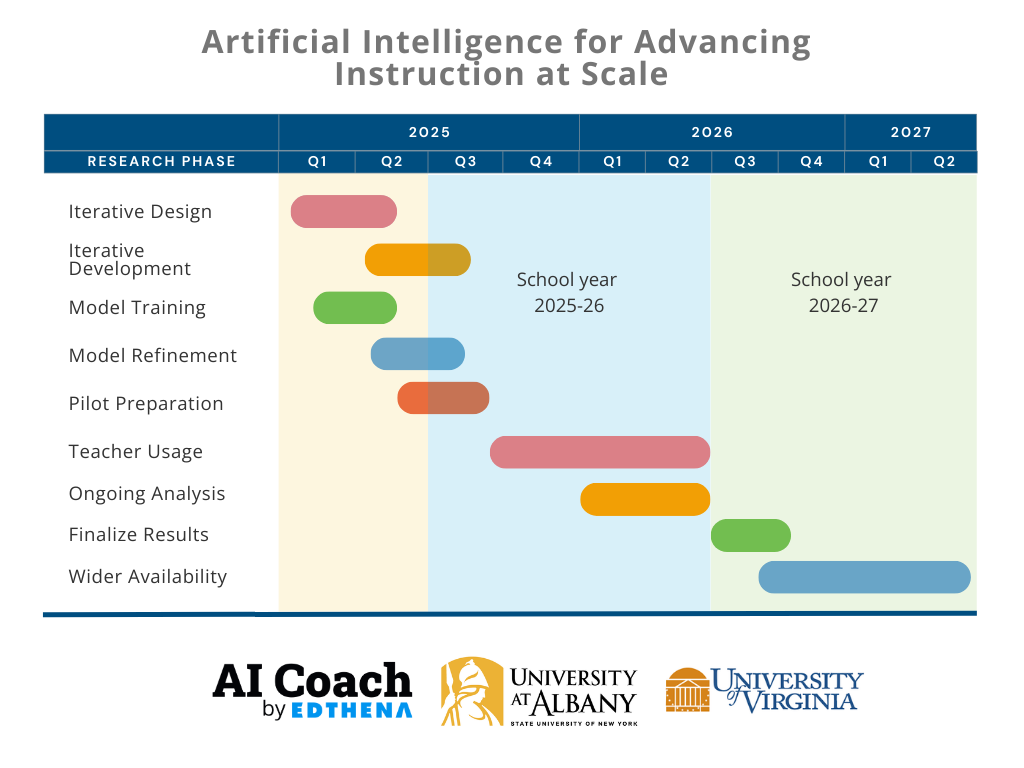Edthena Partners with University Researchers to Bring AI Feedback to Math Teachers

Big news! Edthena is proud to announce our collaboration with researchers at the University of Virginia and the University of Albany on an AI-based multi-modal neural network project funded by the Gates Foundation.
In non-tech speak, it’s a computer that watches and listens to classroom activities to give teachers helpful feedback.
The groundbreaking AI feedback system will be unlike anything available today. It will combine state-of-the-art computer vision and audio analysis providing immediate, actionable feedback that mathematics teachers can use to transform their practice. Reliable and research-validated AI-powered feedback for math instruction is coming soon!
A research-validated AI model for math-focused instructional observations
The Artificial Intelligence for Advancing Instruction at Scale project combines UVA and UAlbany’s educational expertise with Edthena’s technology to develop an AI model that classifies specific elements in classroom videos and provides actionable feedback to mathematics teachers.
“Classroom observational videos are a very helpful tool for improving teaching skills and yet assessing them is an incredibly time-consuming task,” said Peter Youngs, principal investigator of the grant and professor at the UVA School of Education and Human Development.
This project builds on proven research. UVA’s Scott T. Acton serves as a co-principal investigator (co-PI) on the project and has already engineered AI breakthroughs in human action detection technology, applying neural networks to video analysis with remarkable precision.
AI feedback for elementary math teachers and beyond
The initial focus of this project is specifically on improving elementary school mathematics instruction. The system is designed to support teachers in delivering rigorous math instruction while reducing costs for schools and districts.
By making professional development more efficient, affordable, and scalable, we’re working together to support all teachers in improving their mathematics teaching practices.
This partnership reflects our ongoing commitment to research-validated educational technology. We’re ensuring our tools are not just innovative but pedagogically sound and truly effective.
In future projects, with additional training data, it will be possible to expand the technology for more teachers.
Project timeline | AI-powered coaching for math

Research, design, development, and model training is underway now. Teachers will begin using the tool in the 2025-26 academic year. A wider release is planned for the 2026-27 school year.
Beyond the hype | Proven instructional coaching solutions for educators
Many AI-driven tools are built for general purposes and trained on general data (mostly the text of the Internet). However, there is a real need for tools that are trained and validated for specific use cases. For example, medical technology is an area where highly specific training is needed on AI systems before trusting that the outputs will be reliable and correct.
We believe the same can be said for AI systems designed to help improve teaching and learning in schools: rigorous research and evaluation is necessary.
That’s why we’re building these tools in collaboration with research partners who are experts in validating neural network outputs and desgining methods to measure changes in teacher practice. We’re committed to creating solutions that can be used directly by teachers and trusted in real-world classroom implementations.
How can AI feedback be used in supporting math teachers?
The AI tool will use recorded classroom videos to analyze classroom dynamics, capturing details like the quality of teacher-student dialogue, cognitive rigor of lessons, and instructional patterns. When paired with the coaching process of the AI Coach platform, this new prototype tool will provide mathematics teachers with meaningful, practical feedback they can immediately apply.
“This is about helping teachers do what they do best, teach, while making professional development more accessible and equitable,” Scott said.
The model is being trained using classroom videos from a wide variety of classrooms that are hand-coded by trained, human experts. That unique data set is what makes it possible for an AI system that can reliably and credibly observe uploaded classroom videos.
What makes this AI tool different?
“There are limitations with current AI models in the classroom,” said Jonathan Foster, an assistant professor of mathematics education at the University of Albany’s School of Education and a co-PI on the project.
“A lot of [the research projects] are just audio-based, so it will do some speech-to-text recognition and analyze the resulting classroom transcript. But it’s often missing other modalities, like the video itself. So if a teacher asks a question and students are raising their hands or doing some non-verbal communication, you’re missing out on some of those dimensions.”
AI feedback for math that keeps teachers in the driver’s seat
Our role in the research project is to lead the co-design and development of the teacher-facing tools. Don’t worry, the computer is not going to “tell” teachers what to do in their classrooms.
Our design philosophy has always been to support and enhance their professional growth through stronger self-reflection. We do not want to take away teacher agency as part of giving these tools to teachers. Ultimately, we view the computer-based feedback to be a data point that teachers can consider as they work to analyze their classroom practice in more detail.
This new tool is also not meant to replace in-person coaches. It supports teachers and amplifies the impact of coaching by providing private, on-demand feedback between in-person coaching sessions. This feedback is available whenever a teacher seeks it, even on a daily basis.
By combining audio and video analysis, this tool will offer more complete instructional feedback than any current models. Ultimately, teachers will have a more complete portrait of their teaching.
As a result, in-person coaching sessions can be more productive and data-driven, based on the insights teachers gain from the tool.
Do you want to get involved? Join our pilot program
We’re currently seeking school districts interested in participating in the pilot phase of this project. This is an opportunity to gain early access to cutting-edge, research-validated technology that can transform professional development at your school.
Want to stay updated on this project or learn more about participating in our pilot program?
AI Coach for Science of Reading and core instructional practices
Math support is on the way, but your school doesn’t need to wait to support teachers. AI Coach already empowers teachers with guided self-reflection, goal-setting, and action planning for sustaining Science of Reading implementations and maintaining core instructional practices.
Click here to see how AI Coach can help enhance instructional coaching in your school today.
